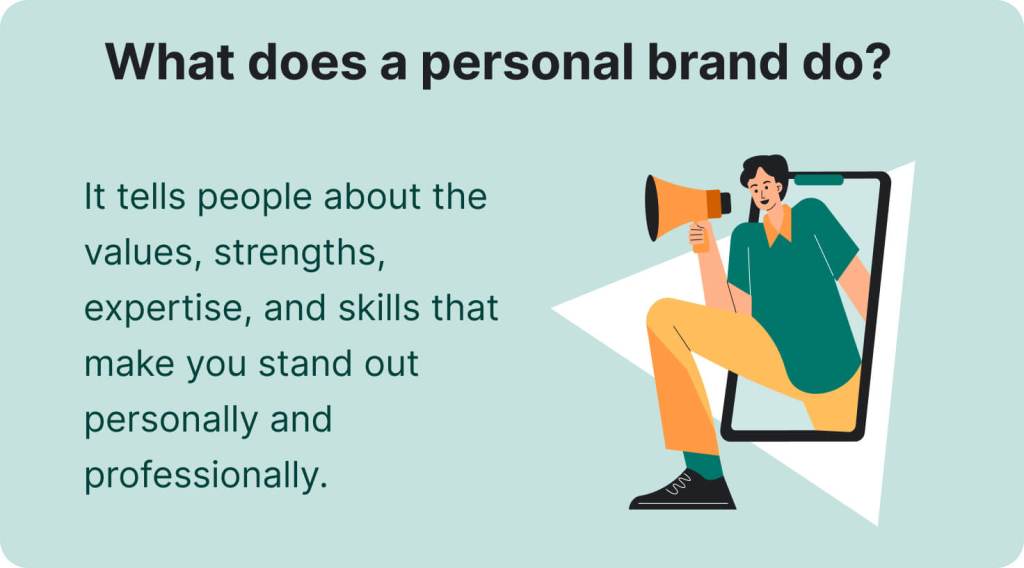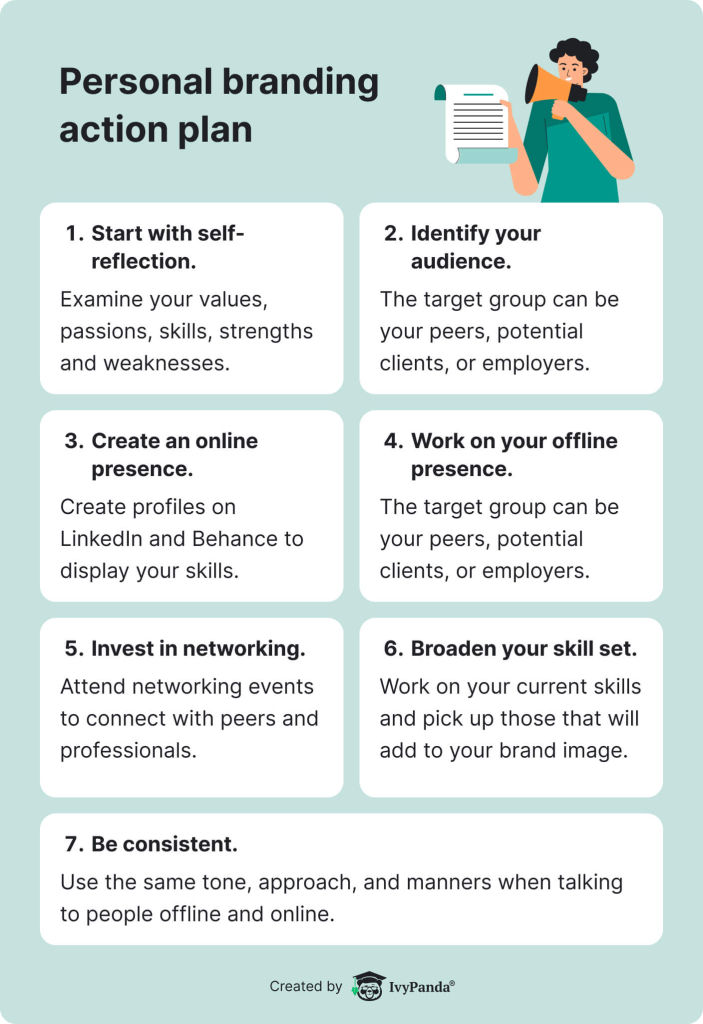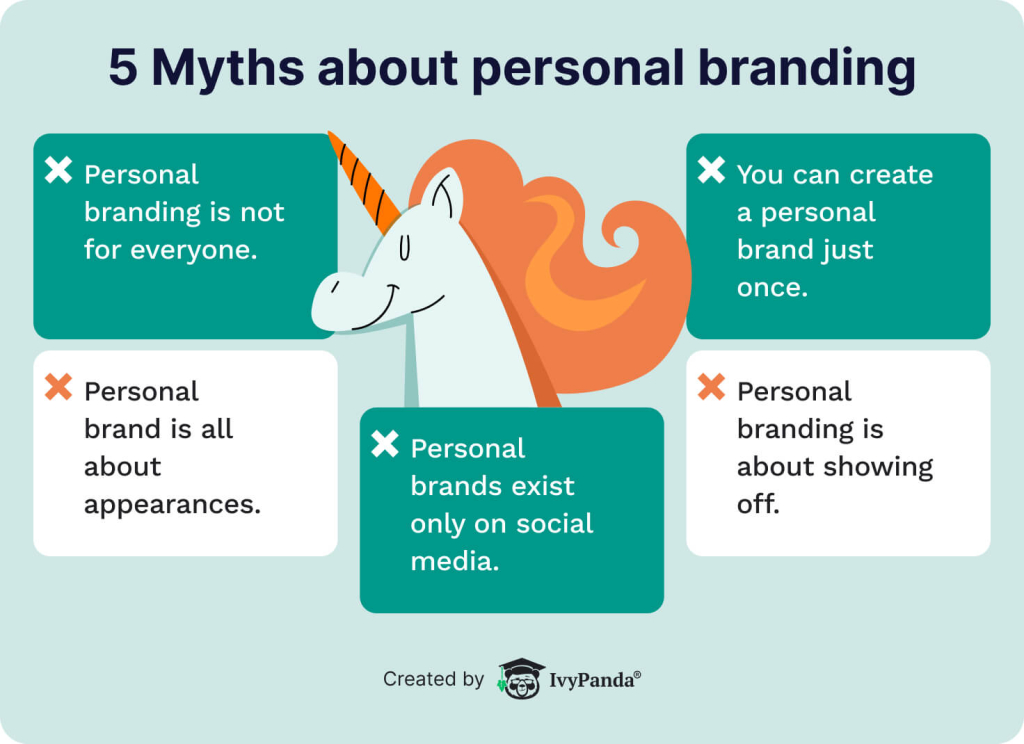When you hear the name Elon Musk, what’s the first thing that comes to mind? His relentless curiosity and enthusiasm for space exploration? His support for free speech? Or perhaps his bold self-confidence? No matter your answer, all these traits are key components of Musk’s brand. These qualities make him instantly recognizable and help him stand out.
The good news is that building a personal brand isn’t just for famous entrepreneurs. Whether a student or an aspiring professional, cultivating an effective personal brand can set you apart in any environment.

In this article, we’ll:
- Dive into the concept of personal branding,
- Explore its benefits,
- Debunk common myths, and
- Help you define and grow your brand.
Ready to shape your image? Let’s get started.
🕵️ What Is Personal Branding?
Personal branding is all about crafting and nurturing the image you project to the world. It’s how you showcase what makes you, you—your values, strengths, expertise, and unique set of skills. It’s like shaping your own narrative, allowing you to guide how people see you, whether it’s in your personal life or your career.
These days, creating a personal brand isn’t just for influencers or top professionals. Students can reap the rewards, too. But for those further along in their careers, the perks are especially clear. A solid personal brand can mean job stability, new business ventures, career growth, recognition, and a stronger professional network.
For students, personal branding is about building a clear identity and highlighting strengths. With a strong image, securing internships, finding good jobs, and growing within your chosen industry becomes easier. Here are some additional benefits:
- Networking opportunities: Connecting with peers, industry experts, and potential colleagues becomes easier.
- Clear career goals: You better understand the kind of career you want.
- Self-awareness: You become well-aware of strengths and weaknesses.
- Prospective offers: You have higher chances to receive scholarships and internships.
Student Personal Branding Musts
Here are the essential elements of any successful personal brand:
- A unique identity: Your knowledge, values, interests, and strengths – everything that defines your authentic self.
- The tone of voice: The right tone helps communicate your competence and personality to your target audience.
- A solid online presence: Today, most networking is done digitally, so ensure your LinkedIn profile and other social media platforms reflect your brand effectively.
- Consistency: Whether online or offline, stay consistent in your interactions. Use the same bio and appearance; always be polite and professional so people remember you. Learn and practice how to give clear talks.
📋 Personal Branding Action Plan

Ready to get started?
Building a personal brand takes effort, but each step is a chance to make a real impression, whether you’re aiming to stand out academically or professionally. Here’s a beginner-friendly guide to get you going:
- Begin with introspection: Dive deep into your core values, passions, talents, and even your shortcomings. Understanding what drives you will help craft how you want others to see you and what you want to stand out for.
- Pinpoint your target audience: Who do you want to connect with—fellow students, potential employers, or clients? Understand what they’re looking for in a personal brand and align your efforts to meet those expectations.
- Establish a solid online presence: Create professional profiles on platforms like LinkedIn or Behance. This will serve as your digital introduction, so ensure it effectively showcases your skills and accomplishments.
- Nurture your offline presence: While your online image is important, how you present yourself in real-life interactions is equally crucial. Ensure that your actions, appearance, and behavior consistently reflect the brand you’re building.
- Prioritize networking: Step out into the real world—attend events, introduce yourself to new people, and build relationships. Whether through volunteering or interning, actively engaging with others will broaden your network and provide valuable experience.
- Constantly upskill: Never stop growing and learning. Take advantage of workshops, online courses, and internships to enhance your knowledge and capabilities. Each new skill adds value to your brand.
- Be consistent: Consistency is key in branding. Make sure your message, tone, and actions align seamlessly across all platforms—whether you’re online or engaging face-to-face.
🦄 Myths about Personal Branding
Run away if someone tells you that you don’t need a personal brand! Here’s what else you should never believe when it comes to personal branding.
MYTH#1 Personal Branding Is Not for Everyone
There’s a common belief that personal brands are only for celebrities and corporate higher-ups. In reality, having a personal brand is essential for everyone, regardless of their status. It’s a powerful tool for carving a niche in any discipline, highlighting your unique value, and opening new opportunities.
MYTH#2 Personal Brand Is All About Appearances
Many believe building a personal brand is the same as painting an idealistic picture of yourself. In reality, authenticity is the name of the game. It requires being honest about your positive and negative sides and acknowledging them. Creating a personal brand doesn’t require pretending to be someone you aren’t.
MYTH#3 Personal Brand Exists Only on Social Media
Another common myth says that brand-building happens only online. To make yourself known, fill up the timeline with relevant posts. While digital presence is essential, there’s much to explore in the real world. Go to professional events, meet new people in the field, attend networking conferences, and other places to build your contacts list.
MYTH#4 Personal Branding Is About Showing Off
Some view personal branding as narcissistic or boastful. However, it’s not about self-promotion – it’s about demonstrating what you can offer. Skills, experience, and knowledge are the core elements of personal branding, showcasing your value and ability to solve problems for clients and employers.
MYTH#5 You Can Create a Personal Brand Just Once
Another myth suggests that developing a personal brand is a one-time task that never needs updating. But that’s not how it works. Personal branding is an ongoing process that evolves over time. Regularly update your profiles, get involved in webinars, develop new skills, and set fresh goals to keep your brand current.

⚔️ Challenges of Building a Personal Brand as a Student
Once you overcome these common misconceptions, it’s essential to be aware of potential troubles that may arise at various stages of building your brand. Having a backup plan for these challenges is essential:
- Poor discipline: This can be addressed by setting clear goals and developing a consistent routine. Create a list of traits you want to be known for and work on them daily.
- Uncertain career prospects: If you’re unsure of your career path after graduation, focus on building transferable skills like problem-solving, time management, and communication. These abilities will add value to your personal brand.
- Impostor syndrome. To stop feeling like you pose as someone else, take stock of your traits, abilities, and knowledge and add them to the brand image.
- A lack of funds. Even if you are short on cash, social media platforms are free. They let you build and grow the foundations of your brand without a hassle.
👨💻 Personal Branding Example
Now,
let’s see how personal branding can work in practice. We’ll build a sample personal brand for Mike.
Mike Smith is a Cornell University student majoring in video game architecture. Here’s what his brand strategy might look like:
Identity: I have a passion for video game development and production, and I’m dedicated to creating immersive worlds that spark the imagination. I’m detail-oriented and eager to push the boundaries of interactive design.
Career direction: I aim to work at one of the top videogame companies, such as Nintendo, Sony Interactive Entertainment, or Ubisoft, where I can contribute to groundbreaking projects.
Target audience: My target audience includes game development studios, indie game creators, and professionals in the gaming industry who value fresh perspectives and cutting-edge game design.
Personal branding statement: As a video game architect, I aspire to create new and immersive AAA titles that redefine the gaming experience.
Online presence: I actively manage a LinkedIn account, where I share my discoveries related to game mechanics and showcase my work with various development tools. I also publish my completed projects, including 3D models and environment designs, on ArtStation and Behance.
Networking: I regularly attend seminars and events related to my field, allowing me to meet and connect with new people. I also engage with industry professionals on platforms like Discord and Reddit, helping me build meaningful connections worldwide.
🏷️ Personal Branding for Students – a Quick Recap
By now, you should have developed a clear understanding of why building a personal brand is valuable for students. Let’s review the key points to keep in mind to improve your standing with future clients and employers.
- Highlight your skills, strengths, and accomplishments both offline and online.
- Stay authentic to your values and interests.
- Actively engage in discussions that can help expand your network.
- Regularly update your profiles to reflect your evolving brand.
- Attend conferences, events, and workshops to stay informed and up-to-date with industry trends.
These tips will help you build and keep a personal brand with ease – so start today! Feel free to dive deeper into the topic if you’d like, but this article covers the essentials of this process.
If you already have a personal brand, share your journey with us!
🔗 References
- Your Personal Brand | Undergraduate Students | College of Liberal Arts
- Professionalism and personal branding – Students – Career Center – Missouri State
- Personal Branding: What It Is, Why to Do It, & How I’m Building Mine
- Personal Branding 101: How to Showcase Your Unique Value
- Nine Misconceptions About Personal Branding



